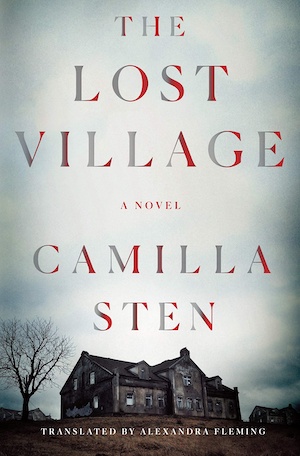Translated by Alexandra Fleming — In 1959, the whole population of a mining village in Norrland, Sweden, disappeared. Only two people were left behind – the body of a woman stoned to death in the village square and a baby in the school classroom. No-one has been to Silvertjärn since and no explanation was ever found. Neither were the bodies. Sixty years later, documentary filmmaker Alice Lindstedt wants to return to Silvertjärn to find out what happened to the 887 residents and who killed Brigitta Lidman. That’s the set-up for The Lost Village, which appeared as Staden when it was first published in Sweden in 2019, and is now appearing in translation around the world.
You might already recognise the author’s surname. She’s the daughter of well-known crime author Viveca Sten and her mother used Camilla as a sounding board for story ideas when she was growing up. The pair have collaborated on a series of young adult thrillers and on a novella. Camilla Sten’s first novel, A New Dawn, was a dystopian thriller about right-wing extremists, but The Lost Village is her crime debut.
Alice and her film crew go to Silvertjärn to shoot some promo footage that they hope will help them win funding for the full documentary, but Alice has a personal interest in the project. Her grandmother, Margareta, lived in the town, but had left for Stockholm to train as a nurse before the rest of the family vanished. Over the years Margareta kept every article ever written about the incident, as well as the letters she exchanged with her younger sister, Aina.
The small detail that Silvertjärn has no cell phone reception, due to the iron ore in the bedrock jamming the magnetic fields, should be cause for concern. Much like decades ago, when the only access to the town was possible by train twice a week, it remains cut off from the rest of the world.
On the surface the town seems like a snapshot of a bygone age – “…a picture-perfect village bathed in golden spring light.” On closer inspection the decay, collapsing walls, sinking houses and rot have permeated the abandoned town. “Houses stand like accusatory skeletons, windows glaring empty.” Sten’s descriptions conjure up images of a town in the aftermath of a nuclear disaster like Chernobyl and the possibility is hinted at since there are no signs of life, not even dead flies or insects. Coffee cups remain on kitchen counters, doors stand open with windows ajar. What caused everyone to leave so abruptly and where did they go?
The crew, which includes Alice’s friend Tone, director Emmy, technician Robert and a financial backer called Max, start to explore the village building by building, looking for clues that the initial police investigation missed. What they find instead are unexplained sounds, voices and figures lurking in the shadows. Jokingly, they consider making a horror film instead of a documentary. And horror is very much the direction in which The Lost Village heads. When the truck with all their supplies and equipment is blown to pieces in the village square, the suspicion that they are not alone is confirmed. Of course the immediate thought is that a supernatural force is at work. Sten excels at keeping us in the dark until the very end.
When Tone disappears, Alice is forced to reveal the harrowing reason why Tone joined the project. Then things turn deadly and the importance of making a documentary takes a back seat. Now the goal is simply to survive.
In alternating chapters, we are taken back to the events of 1959. After the mine unexpectedly closes, the townsfolk are trapped in a downward spiral of unemployment, poverty and desperation. With despair comes vulnerability and when a new pastor arrives out of the blue he claims to be the saviour they are so desperately looking for. With his smooth, boyish face, Pastor Mattias mesmerises the local women, who wear their best dresses to church to attract his attention. The only person able to resist is Elsa, Alice’s great-grandmother, who witnesses her husband take to the bottle after losing his job, while 12-year-old Aina falls under Mattias’s spell. Tensions ramp up and violence ensues.
The reason for the disappearance of the town’s people becomes clear fairly early in the novel, which might disappoint readers. Fortunately there’s more to this story and the present day revelations are far less predictable. Call me naive, but I certainly couldn’t guess the reason behind the sabotage, attacks and general spooky goings-on in the deserted town.
The Lost Village is described as The Blair Witch Project meets Midsommar, but these comparisons underestimate Sten’s writing. She creates a thoroughly ominous atmosphere, accentuating the town’s unnatural stillness and an ever-present feeling that something really disturbing is about to happen. This makes for the consistently nail-biting, unsettling feeling we know so well from horror movies. It wouldn’t be surprising if rumours start flying about a film adaptation of The Lost Village.
But this is more than merely a scream-a-minute Hollywood-style thriller. Although the premise is nothing new, it’s neither melodramatic and stereotypical nor predictable – on the contrary, Sten’s is a fresh voice on the crime fiction front. When reading crime fiction or a thriller by a Swedish author there’s an expectation that it will fall into the genre of Nordic Noir. Not in this case. Even though The Lost Village is big on setting and atmosphere this story could take place anywhere, and maybe that’s also its appeal.
Also see To Cook a Bear by Mikael Niemi and The Hanging Girl by Jussi Adler-Olsen.
Minotaur Books
Print/Kindle/iBook
£9.32
CFL Rating: 4 Stars
